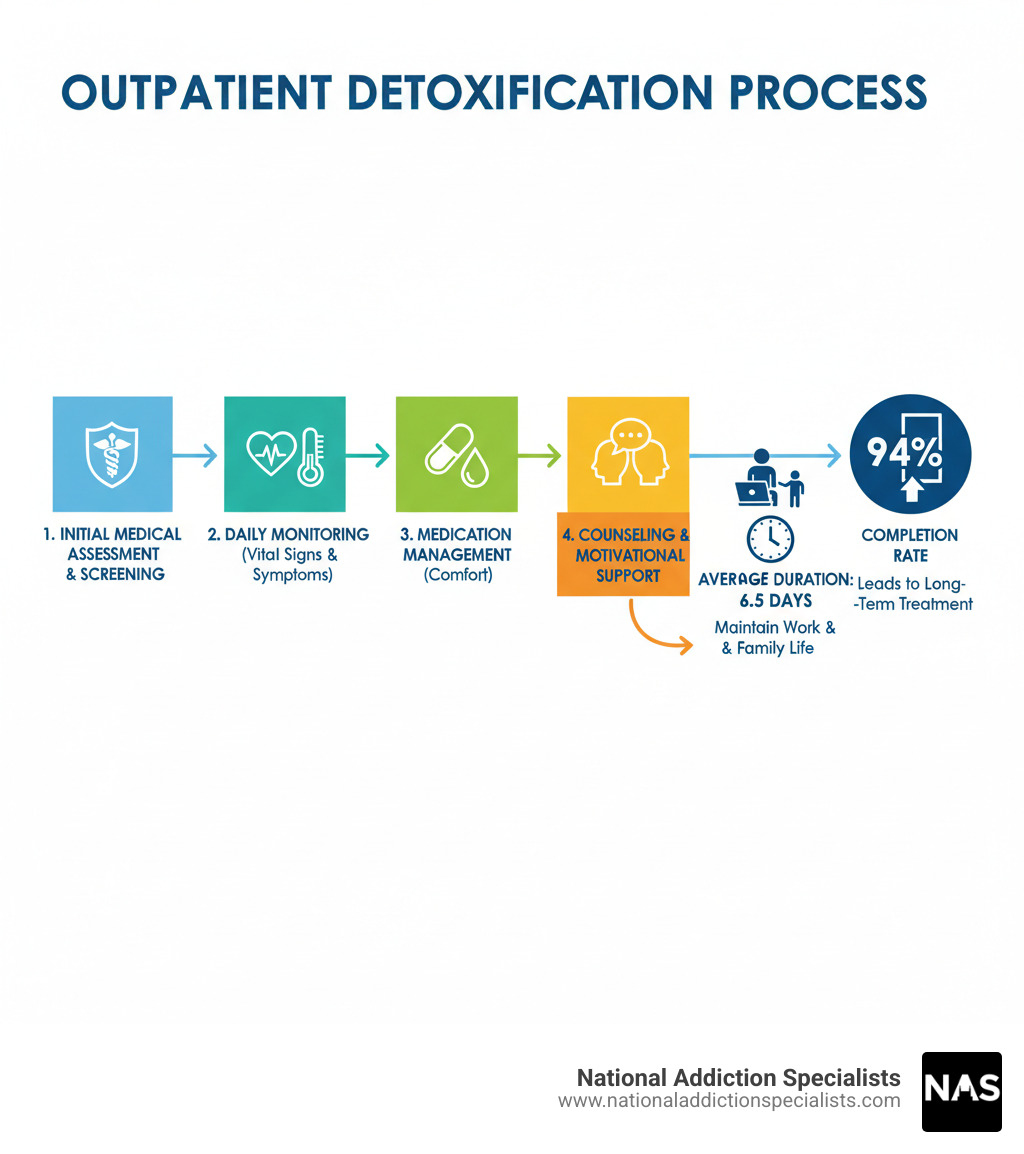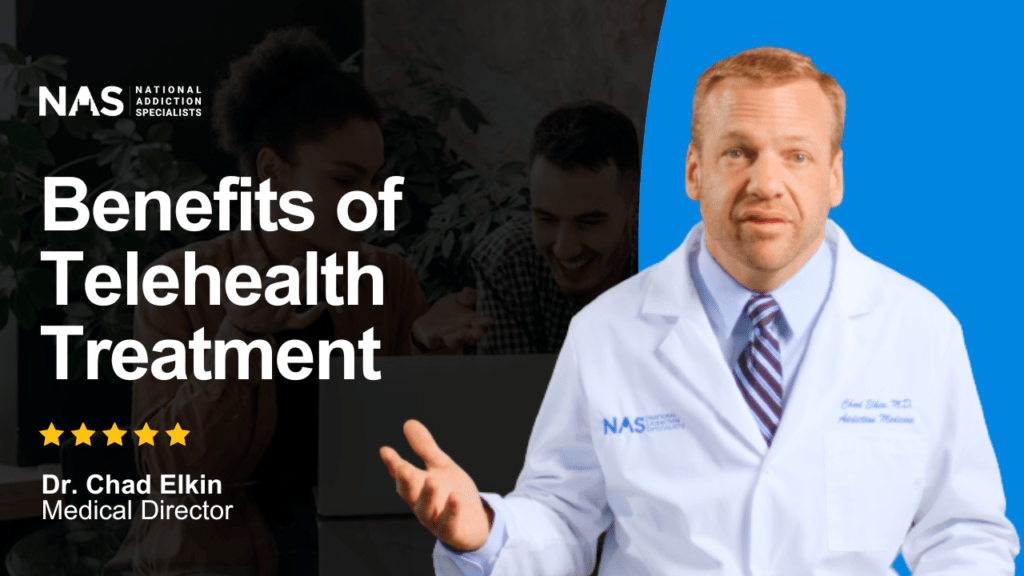What You Need to Know About Outpatient Detoxification
Outpatient detoxification is a medical treatment that helps you safely withdraw from drugs or alcohol while living at home. Instead of a residential stay, you visit a clinic or use telehealth for regular monitoring. It’s an effective first step toward recovery, especially if you have a supportive home environment and mild-to-moderate symptoms.
Key features of outpatient detox:
- Where: You stay at home and visit a clinic or use telehealth for check-ins
- Duration: Typically 3 to 14 days (average 6.5 days)
- Cost: $175 to $388 per patient, compared to $3,319 to $3,665 for inpatient care
- Best for: Mild-to-moderate withdrawal symptoms with stable home support
- Success rate: Studies show 94% completion rate for alcohol detox programs
- Medical support: Daily monitoring, medication management, and counseling
- Flexibility: Maintain work, family, and daily responsibilities during treatment
If you’ve been delaying treatment due to work or family commitments, outpatient detox offers a practical solution. Research shows it’s as safe and effective as inpatient care for many, at a fraction of the cost, allowing you to maintain your daily life.
I’m Dr. Chad Elkin, founder of National Addiction Specialists. As a board-certified addiction medicine physician, I’ve helped thousands of patients through outpatient detoxification using telemedicine. My experience has shown that removing barriers like cost and time is key to successful recovery.

Outpatient detoxification helpful reading:
Understanding Detoxification: Focus on Outpatient Care
Detoxification, or detox, is the medically supervised process of clearing drugs or alcohol from your body while managing withdrawal symptoms. It’s the first step in recovery, designed to keep you safe and comfortable. While inpatient detox (residing in a facility) was once the standard, medical advances have made outpatient detoxification a safe and equally effective option for many.
In outpatient care, you live at home and attend regular appointments at a clinic or via telehealth, receiving medical support without disrupting your daily life.
Here’s how the two approaches compare:
| Feature | Outpatient Detoxification | Inpatient Detoxification |
|---|---|---|
| Location | Patient remains at home, visits clinic or uses telehealth | Patient resides in a dedicated treatment facility |
| Supervision | Daily medical monitoring, scheduled check-ups | 24/7 medical supervision and support |
| Cost | Significantly lower ($175 to $388 per patient) | Substantially higher ($3,319 to $3,665 per patient) |
| Duration | Shorter (average 6.5 days) | Longer (average 9.2 days, can be 5-14 days) |
| Ideal Candidate | Mild-to-moderate withdrawal, stable home, good health | Severe withdrawal, complex medical needs, unstable home |
(Cost and duration data from Hayashida M et al., 1989, studying mild-to-moderate alcohol withdrawal syndrome)
Benefits of Outpatient Care
Outpatient detoxification offers real advantages that make starting treatment more accessible.
- Flexibility: Continue working and caring for your family. Outpatient care fits into your life, removing the barrier of being away from home.
- Cost: Outpatient detox is significantly more affordable, costing hundreds instead of thousands of dollars, and is often well-covered by insurance.
- Comfort: Recovering in your own home provides a sense of normalcy and comfort during a challenging time.
- Support: Your family and friends can be actively involved in your daily support system.
- Seamless Transition: Integrating recovery into your daily routine from the start makes it easier to continue with long-term treatment.
Drawbacks of Outpatient Care
While beneficial, outpatient detoxification isn’t for everyone and has potential challenges.
- Higher Relapse Risk: Without 24/7 supervision, the temptation to use can be greater, especially if your home environment isn’t substance-free.
- Less Intensive Monitoring: Daily check-ins are standard, but they don’t offer the immediate, round-the-clock medical access of an inpatient facility. This makes it unsuitable for those at risk of severe complications.
- Requires Self-Discipline: Success depends heavily on your commitment to following the treatment plan, taking medications, and attending appointments.
- Potentially Lower Completion Rates: While some studies show lower completion for the detox phase itself, long-term success is more closely tied to personal motivation and support than the detox setting.
Understanding these trade-offs helps you make an informed choice. For more detailed research on how outpatient and inpatient detox compare for alcohol withdrawal, you can review this study: Comparative effectiveness and costs of outpatient detoxification for patients with mild-to-moderate alcohol withdrawal syndrome.
The bottom line? Outpatient detoxification works beautifully for the right person in the right circumstances. The key is an honest assessment with a medical professional.
Is Outpatient Detoxification Right for You?
Choosing the right detox setting is a critical decision based on safety and your unique needs. Medical professionals use established guidelines, like the ASAM (American Society of Addiction Medicine) Patient Placement Criteria, to determine if outpatient detoxification is a suitable fit. This assessment considers your withdrawal severity, medical and mental health, relapse risk, and home environment to ensure you receive the safest, most effective level of care.

Who is a Suitable Candidate for Outpatient Detoxification?
Outpatient detoxification is an excellent choice for individuals who meet the following criteria:
- Mild-to-moderate withdrawal symptoms: Outpatient care is ideal for managing symptoms like anxiety, nausea, and tremors. Those at risk for severe complications like seizures or delirium tremens (DTs) require inpatient care.
- A stable, substance-free home environment: Your living situation must support recovery, not undermine it.
- A strong support system: Having a committed friend or family member to check on you and provide encouragement is crucial.
- Good overall physical health: If you have severe medical conditions (e.g., uncontrolled heart disease, liver failure), the stress of withdrawal requires 24/7 monitoring.
- Mental health stability: Inpatient care is necessary for individuals with severe depression, suicidal thoughts, or psychosis.
- High motivation for recovery: Self-discipline is key in an outpatient setting where you are more responsible for your own progress.
- Reliable transportation or internet access: You must be able to consistently attend clinic visits or telehealth appointments.
Key Safety Considerations for Success
When you’re a good candidate for outpatient detoxification, these safety measures support your success:
- Thorough Initial Assessment: Before starting, a comprehensive evaluation of your medical history, substance use, and psychological state identifies any risks.
- A Committed Support Person: This individual acts as a safety net, helping you follow the plan and seeking help if needed.
- Daily Professional Monitoring: Regular check-ins (in-person or via telehealth) allow your medical team to track vital signs, manage symptoms, and adjust medications.
- Adherence to the Treatment Plan: Following medication schedules and attending all appointments is essential for your safety.
- Open Communication: Honest communication with your care team ensures your treatment plan is adjusted to meet your real-time needs.
For more information on the comprehensive support available throughout your recovery journey, explore our addiction counseling services.
The Structure and Process of an Outpatient Detoxification Program
An outpatient detoxification program is structured to be both safe and flexible, allowing you to maintain your daily life while receiving expert care. Think of it as having a medical team guiding you through withdrawal while you stay connected to your home and responsibilities.

What to Expect During Outpatient Detoxification
Here’s what the process typically involves:
- Initial Intake and Evaluation: Your journey starts with a comprehensive assessment of your substance use history, health, and home environment, conducted in person or via telehealth.
- Personalized Treatment Plan: Based on the evaluation, we create a custom roadmap for your detox. This plan outlines medications, check-in frequency, and counseling needs.
- Daily Check-Ins: You’ll have daily contact with your medical team through clinic visits or telehealth appointments. At National Addiction Specialists, our patients in Tennessee and Virginia can conveniently connect from home.
- Symptom Monitoring: During each check-in, we monitor your vital signs and withdrawal symptoms to ensure your comfort and safety, adjusting medications as needed.
- Typical Duration: Most programs last 3 to 14 days, with an average of about 6.5 days. The timeline is custom to your specific needs and substance use.
Medical and Psychological Support Provided
Effective detox addresses both body and mind. Support includes:
- Medical Supervision: Our healthcare team monitors your health throughout the process to manage any complications and ensure a safe withdrawal.
- Medication-Assisted Treatment (MAT): MAT is a cornerstone of our approach. We use FDA-approved medications to ease withdrawal symptoms and reduce cravings. Our Medication-Assisted Treatment (MAT) Online program makes this accessible.
- For alcohol withdrawal: Benzodiazepines (e.g., Librium, Ativan) are used to prevent severe symptoms like seizures, along with thiamine to protect neurological health.
- For opioid withdrawal: Buprenorphine (like Suboxone) is highly effective at managing symptoms and cravings. Learn more at What is Suboxone?.
- Psychotherapy and Counseling: We address the psychological aspects of addiction through individual counseling, helping you develop coping strategies and build a foundation for relapse prevention.
- Motivational Interviewing: This collaborative counseling style strengthens your personal motivation for change and has proven effective in outpatient settings.
- Connection to Support Groups: We encourage participation in groups like Alcoholics Anonymous (AA) or Narcotics Anonymous (NA) for valuable peer support.
For a deeper look at the medical and psychological aspects of outpatient care, you can explore this resource: An Overview of Outpatient Detoxification.
Effectiveness and Long-Term Outcomes
For the right candidates, outpatient detoxification is a highly effective first step toward recovery, but success depends on what comes next.
How Effective is Outpatient Detox?
For individuals with mild-to-moderate withdrawal, outpatient detoxification is proven to be safe and effective. The evidence includes:
- High Completion Rates: One study on outpatient alcohol detox found a 94% completion rate, showing that most people can safely manage withdrawal at home with proper support.
- Strong Safety Profile: Research confirms that for appropriate candidates, outpatient detox is a safe, low-cost option with no serious medical complications observed in comparative studies.
- Successful Transition to Further Treatment: The same study showed that 91% of those who completed outpatient detox continued with a long-term treatment program, which is crucial for lasting recovery.
- Patient Characteristics as Key Predictors: Long-term success is more dependent on factors like motivation, a stable home, and good health than on the detox setting itself, highlighting the importance of proper patient selection.
Transitioning to Long-Term Recovery
We emphasize to every patient that detox is just the first step. Addiction is a chronic condition, and lasting recovery requires ongoing support. After detox, the focus shifts to building a foundation for a sober life. Key components include:
- Counseling and Therapy: Individual and group therapy helps address the root causes of addiction, explore behavioral patterns, and develop strategies for maintaining sobriety.
- Relapse Prevention Strategies: Learning to identify triggers, manage cravings, and build a strong support system is critical. We help create individualized plans to steer challenges. For more insights, explore our Addiction Recovery Strategies.
- Long-Term Sobriety Goals: Recovery is about building a fulfilling life. We help patients set meaningful goals related to their relationships, career, health, and personal growth.
The transition from outpatient detoxification to long-term recovery is where lives truly change. With the right support and a comprehensive treatment plan, lasting sobriety is achievable.
Make an Appointment to Treat Addiction
Please don’t hesitate. Make an appointment today.
Frequently Asked Questions about Outpatient Detox
Here, we address some of the most common inquiries about outpatient detoxification.
How much does outpatient detox cost?
A major benefit of outpatient detoxification is its affordability. Studies show costs can be as low as $175 to $388 per patient, compared to over $3,000 for inpatient care. The final cost depends on your program, location (like Tennessee or Virginia), and treatment duration. Many insurance plans, including Medicare and Medicaid, cover outpatient detox. Contact your provider to confirm your benefits. For more on insurance for specific treatments, see Does Insurance Cover Suboxone Treatment?.
Can I work during outpatient detox?
Yes. A primary benefit of outpatient detoxification is the flexibility to maintain your daily responsibilities, including work and school. Programs are designed to fit your schedule, with evening, weekend, or telehealth appointments. Our telemedicine model at National Addiction Specialists makes it even easier to receive care without disrupting your life. You can continue earning an income and supporting your family while getting the help you need.
Is outpatient detox safe for opioid withdrawal?
Yes, outpatient detoxification is a safe and effective option for opioid withdrawal, especially with Medication-Assisted Treatment (MAT). While uncomfortable, opioid withdrawal is not typically life-threatening like withdrawal from alcohol. Under medical supervision, medications like buprenorphine (Suboxone) are prescribed to significantly reduce symptoms and cravings, making the process more manageable. National Addiction Specialists offers Telehealth Suboxone Treatment for patients in Tennessee and Virginia, providing a proven path to recovery from home.
Conclusion
Taking the first step toward recovery is courageous, and outpatient detoxification offers a practical, proven path that fits into your life. It combines medical safety and expert supervision with the flexibility to remain at home, connected to work and family. For those with mild-to-moderate symptoms and a stable environment, it’s a safe, effective, and affordable alternative to inpatient care.
Research confirms high completion rates and successful transitions to long-term treatment. However, detox is only the beginning. Lasting sobriety is built through ongoing commitment to counseling, support groups, and a comprehensive recovery plan.
At National Addiction Specialists, we make expert addiction treatment accessible through our telemedicine-based approach. We provide outpatient detoxification and ongoing Medication-Assisted Treatment to patients in Tennessee and Virginia, removing barriers like cost, travel, and stigma.
Recovery is within reach. If you’ve been held back by life’s responsibilities, know that there is a flexible path forward.
Learn more about our Medication-Assisted Treatment program and find how we can support you in taking that crucial first step toward a healthier, substance-free life.
This article was medically reviewed by:
Chad Elkin, MD, DFASAM is a board-certified addiction medicine physician, founder, and Chief Medical Officer of National Addiction Specialists, dedicated to treating substance use disorders. A Distinguished Fellow of the American Society of Addiction Medicine (ASAM), Dr Elkin currently serves as President of the Tennessee Society of Addiction Medicine (TNSAM) and has held various leadership roles within the organization. Dr Elkin chairs ASAM’s Health Technology Subcommittee and is an active member of its Practice Management and Regulatory Affairs Committee, State Advocacy and Legislative Affairs Committee, and other committees. He also serves on the planning committee for the Vanderbilt Mid-South Addiction Conference. Committed to advancing evidence-based policy, Dr Elkin is Chairman of the Tennessee Association of Alcohol, Drug, & Other Addiction Services (TAADAS) Addiction Medicine Council, which collaborates with the TN Department of Mental Health & Substance Abuse Services (TDMHSAS). He has contributed to numerous local, state, and national task forces, helping develop professional guidelines, policies, and laws that align with best practices in addiction medicine. His work focuses on reducing addiction-related harm, combating stigma, and ensuring access to effective treatment. Passionate about the field of addiction medicine, he remains dedicated to shaping policy and enhancing patient care.
Suboxone® and Subutex® are a registered trademark of Indivior UK Limited. Any mention and reference of Suboxone® and Subutex® in this website is for informational purposes only and is not an endorsement or sponsorship by Indivior UK Limited.









